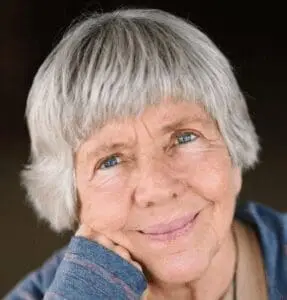When I was a girl, my doctor mother taught me to be kind. When she left the house in the morning, she would say, “Your assignment today is to help someone,” and when she returned at night, she would ask, “What was your good deed for the day?”
My grandmother told me that our job was to leave the world a better place because we lived in it. Our small-town’s library’s shelves were stocked with books about good little girls and inspirational adults. And our Methodist Church, the church of the early abolitionists, taught that our salvation came from good works. In short, I received a big dose of training in compassion and responsibility. Many of us were raised this way.
This guidance was easier to follow in the 1950s in the small society of Beaver City, Nebraska, with its 400 people. We had only our local weekly paper and Look magazine to give us information about the world at large. We didn’t have television or computers; we mostly had conversations and stories from people we knew. Now, when I have access to the news of about 8 billion people, it’s much harder to be kind to everyone.
My heart breaks for the migrant children now excluded from Head Start, the starving people of Gaza, and the innocents imprisoned in El Salvador or Alligator Alcatraz. I feel sadness for the Haitians and South Sudanese in lawless countries, and for the citizens of Myanmar, Tibet, and North Korea. And I worry about the planet itself with its climate change and constant weather-related disasters. I mourn the loss of bees and monarchs and the near extinction of polar bears.
Most of us are traumatized by our 24/7 news cycle. Humans were not designed to absorb this amount of information. Nor were we designed to ignore suffering. We evolved to respond to what we could see and touch.
Compassion is the building block for understanding our human family. Without it, we’re imprisoned on the small, lonely island of self. Without it, all our relationships are exploitive and transactional, and we have no ability to love. Psychologists know that what makes humans happy is the high quality of our relationships. Happy people are loved and loving. Truly enlightened people know we’re all brothers and sisters and that, unless we learn to get along, we’ll perish.
I like this Buddhist prayer that includes all living beings: May all beings everywhere, with whom we are interconnected, be awakened, fulfilled, liberated and free. May there be peace on earth and throughout the universe and may we all complete the spiritual journey. Really, this prayer is ecumenical. All great religions teach us to be kind.
Thich Nhat Hahn managed to carry the tragedy of Viet Nam with an incredible lightness of being. Buddhist teacher Joanna Macy encouraged her followers to open their hearts fully so that all the world could rush in. I admire this idea, but I find it a challenge. The pain and grief I know often exceeds the carrying capacity of my heart.
Action is the antidote to despair. Empathy plus action gives us hope. Yet we cannot always act on behalf of those who are suffering. Empathy without action leads to despair. This awareness of the suffering is stored in our bodies. We struggle to find a solution for this complicated pain.
People try to cope with the constant bombardment of upsetting information in all kinds of ways—by psychic numbing, by using drugs and alcohol, by zoning out on television and computer games, or by exploding into anger. Others find ways to be of help.
We all have a causal scope, which is the area within which we have agency. My causal scope includes the people in my family and my town. Just as in Beaver City, I have a reasonable number of people I can help. So do you, dear reader. We can still manage to do a good deed every day and strive to make the world a better place because we lived here.
Both Joanna Macy and Thich Nhat Hahn devoted their lives to worldwide organizing. Macy traveled the world to form groups that do what she called “the work that reconnects.” Thich Nhat Hahn founded The Order of Interbeing and created a community called Plum Village. He spent his life working for peace.
We can increase our causal scope by joining a group. When we work with others, we can tackle more complicated problems than those we can tackle alone. Group work inspires us and allows us to progress toward the largest of goals. We won’t be able to improve all situations, but we can have an impact on the environment, democracy, social justice, and peace. Groups make us feel more hopeful and less alone.
Our pain for the world doesn’t mean we can’t be happy. In fact, it’s critical that we balance our sorrows with our joys and that we find enough love in the world to balance out the cruelty. The greater our suffering, the wilder and more ecstatic should be our dance.
We can arrange our lives so that we have good daily, weekly, monthly and yearly habits. With attitude and intention, we can build a good day. Every morning, we can set our intention to look for joy, humor, or opportunities for gratitude. Every day, beauty and kindness rain down all around us. If only we pay attention, we can see the luminous everywhere.
Mary Pipher
Mary Pipher, PhD, is a clinical psychologist, author, and climate activist. She’s a contributing writer for The New York Times and the author of 12 books, including Reviving Ophelia, Women Rowing North, and her latest, A Life in Light. Four of her books have been New York Times bestsellers. She’s received two American Psychological Association Presidential Citation awards, one of which she returned to protest psychologists’ involvement in enhanced interrogations at Guantanamo.













